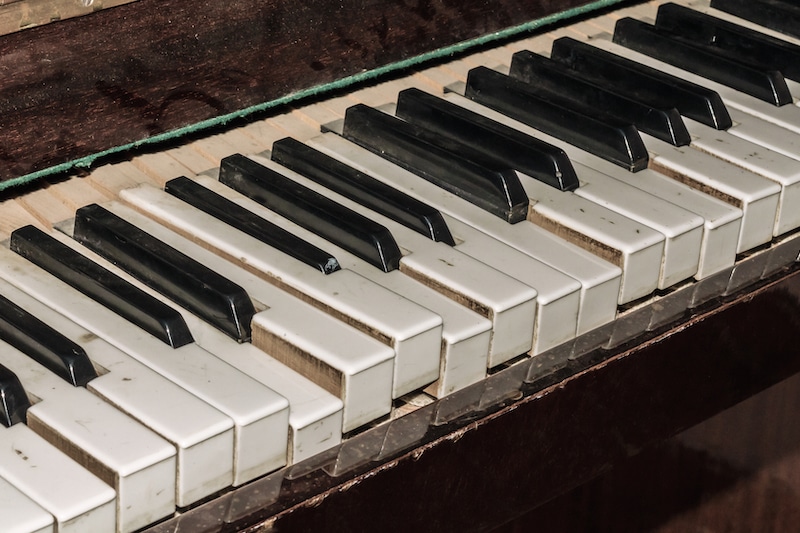Sticky piano keys are one of the most annoying things that can happen to a pianist. Just when you go to play that finishing note, the key sticks and your finger falters. What a pain!
Before you pick up the phone to call your local piano maintenance guru, consider that you might be able to fix the sticky keys yourself!
Keep reading if you’re into a bit of DIY and want to take a crack at fixing your sticky piano keys, saving a few bucks in the process.
However, you can’t fix every sticky piano key without professional help. There are a few reasons why your piano keys might be sticky, and we’ll wade through the weeds with you below.
What Causes Sticky Piano Keys?

There are a few reasons why your piano keys are sticking, some are easier to address than others.
Let’s take a look at some of the reasons why keys might be stuck.
Humidity
Like most maintenance problems associated with acoustic pianos, humidity is most often the cause of sticky piano keys.
Pianos are made up of thousands of small, complex wooden parts, all of which are affected by the changing of the seasons.
The wood in pianos expands and contracts as humidity levels go up and down, the various parts constantly retaining and releasing moisture from the air.
Often, sticky keys are the first symptom of this process since the parts holding keys in place are some of the most sensitive to humidity. If you have sticky keys, you most probably have a humidity problem.
Something Is Stuck Underneath the Key
While humidity affects most of the piano keys, you might only have one or two sticky keys. If this is the case, you may want to check underneath the keys to make sure there isn’t an obstruction of some kind.
Small things like a scrap of paper or crumbs from your morning muffin might slip between piano keys, lodging themselves in places you might not see immediately. While seemingly minor, small objects will hinder the proper movement of the keys, often resulting in a clanking or sticky key.
Children may also be the cause of this sort of sticky situation. While adorable, they commonly put things where they shouldn’t go, like a quarter between your D and E keys, and these objects may go unnoticed for a while, causing sticky keys.
Parts Malfunction
Sometimes, sticky piano keys aren’t the result of humidity or funny money between your keys.
As we’ve mentioned, pianos have thousands of intricate parts, some of which may malfunction from time to time. Your key might not fit quite right, it might have tight bushings, or the key slip may have warped.
There are a ton of technical things that could be wrong to cause your stick keys, all of which would need professional assistance to repair. Otherwise, you risk damaging your precious piano if you try to fix an internal issue without the proper training.
Below, we’ll go through some non-invasive repair methods that you can try at home. If these fail, you’ll want to call up your local piano guru to take a look at your instrument.
Can I Fix Stuck Piano Keys On My Own?

While it’s entirely possible to fix your stuck piano key without professional help, we don’t recommend performing any sort of invasive repair without at least first consulting a professional.
Fixing Humid Keys
As you may know, unless you’re an X-Man, no one can control the weather. However, controlling indoor humidity is fairly simple if you have central air conditioning.
Setting a strict temperature control in the area your piano is located will prevent most of the issues you may have with humidity, including sticky keys. Also, devices like The Piano Life Saver can help regulate your piano’s humidity levels as well.
However, if you can’t adequately regulate the temperature of the space or you live in a particularly humid climate year-round, you can use a screwdriver for a quick fix.
Simply depress the sticky key along with the keys next to it. Then, slip a very thin flat-head screwdriver between the keys, gently wiggling as you do so. This should separate the keys enough to prevent more sticking.
However, this is typically only a temporary fix, and you have to be extremely careful when separating the keys or risk damaging the piano even further.
Fixing Stuck Items
If there’s something stuck underneath one of your keys, it can be a pretty simple task to get it out yourself if you own an upright piano.
Upright pianos often have a rectangular section of wood located behind the music desk, underneath which is a fallboard that covers the keys. The rectangular section should have catches that detach easily on either side.
Once the wood is removed, simply lift up the fallboard to have access to the keys. Then, gently wiggle the keys to get them loose and check underneath them. If there’s an object there, simply remove it, and you will have fixed your sticky key problem!
Grand piano keys, however, are much harder to remove, and we don’t recommend this method if you own one. Get a technician to fix a grand piano’s keys before attempting to remove them yourself.
Are Sticky Piano Keys Expensive to Fix?
If the issue with your sticky key isn’t something you can fix with one of the above methods, you’ll need to contact a piano technician. They have all the tools and experience necessary to fix your piano keys, no matter the issue.
However, be aware that fixing piano keys isn’t exactly the cheapest thing out there. It can cost anywhere from $50 to $100 to fix a single key, and if the issue spans several keys, it may cost much more.
If you do enlist the help of a piano repair technician, you may want to have them take a look at the instrument’s other parts as well. Make sure that they fix everything you can in one visit. Otherwise, you’ll see your maintenance costs grow more quickly than many think possible.
The best way to prevent expensive piano repair bills is to regulate the temperature and humidity of the piano’s environment as well as you can.
What’s the Best Way to Clean Sticky Piano Keys?
If you want an in-depth review of the best ways to clean your piano keys, then check out our article on the subject here. However, know that you should avoid using commercial cleaning products.
Instead, use a home solution of 4 parts water to one part dish soap, gently cleaning and drying each and every key to keep them from sticking.
Conclusion
Sticky keys can be a hassle, but we hope by the end of this article you’ve figured out exactly what you need to do to fix your sticky situation!
Whether you can do it on your own or you need to enlist the help of a technician, sticky keys are one of the easier piano-related issues to solve.
If you remember to keep them clean and maintain a consistent temperature and humidity, then your piano keys should be in great shape for years to come!
